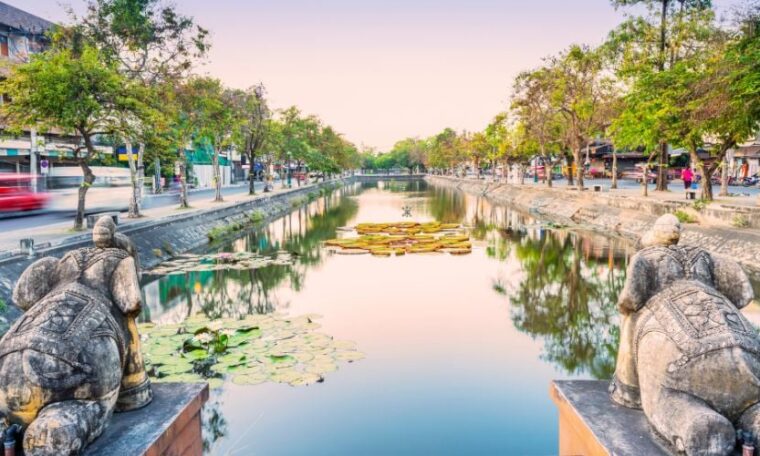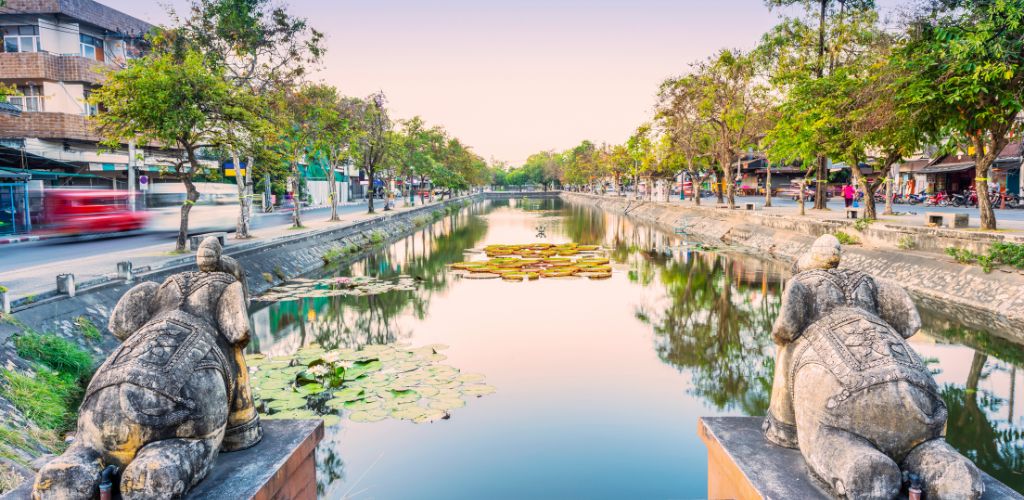
If you search for the most popular digital nomad locations, Chiang Mai is sure to appear on that list. If you don’t want to be instantly hooked, don’t look any further—this is one place so intoxicating that you’ll be planning your trip without delay. There are countless pros of living in Chiang Mai; it’s no wonder that so many remote workers and tourists alike flock there year after year.
Having spent several months living in Chiang Mai myself, I would love to go back, and I absolutely will at some point. It’s a sociable place, popular with countless other remote workers and friendly locals. The pros of living in Chiang Mai far outweigh the negatives in my opinion, but it’s important to know about both sides of the coin to make your own informed decision before taking the plunge.
15 Pros and Cons of Living in Chiang Mai

For me, Chiang Mai is the jewel in Thailand’s crown. Yes, Thailand is a big country with amazing beaches, like Koh Samui and Phuket, and the vibrancy of Bangkok is unbeaten, but there’s nothing quite like everyday life in the northern city of Chiang Mai. It has its challenges, as well as its major advantages, and having experienced most that Chiang Mai has to offer, I feel pretty well-informed to help you out.
Pros of Living in Chiang Mai

Because I like to focus on positivity before anything else, let’s start with the advantages of living in Chiang Mai. By the end of this list, you’ll probably have one foot on the plane and be planning your first few days in the city.
1. A Great Place to Meet Other Digital Nomads

Without a doubt, one of the biggest pros of living in Chiang Mai is just how easy it is to meet other remote workers. In 2023, a huge 3.9 million people passed through the doors of Chiang Mai airport, with a decent proportion of those sure to be digital nomads. No matter when you visit, you’re guaranteed to meet plenty of other like-minded people, which will make your stay so much more enjoyable.
I’ll talk about coworking spaces shortly, but most have regular social evenings, with a focus on bringing people together—the same goes for hostels around the city. It’s so easy to mingle in Chiang Mai, and I met many new friends whom I still keep in touch with today. The city offers many great opportunities to collaborate, but if socializing is all you have in mind, you really won’t struggle to find a new buddy or two.
2. Cost-Effectiveness

Chiang Mai is a pretty cost-effective place to stay over the long term. For example, you can usually find an apartment in the city center or even trendy Nimman, for around 7800-14,000 THB ($220-$390) with utilities on top. If you can find a coliving space or simply share with another remote worker, you’ll save even more on accommodation.
It’s cheap to eat out too, as long as you stick to local food; if you want Western-style meals then you can expect to pay more. One of my favorite places was the Chiang Mai Night Bazaar, where it’s possible to fill yourself with street food for a very small amount of cash. Even coffee shops are cheap—you can find a cappuccino for around 55THB ($1.50), and these are great places to work from too.
3. Safety

When you’re looking at the pros and cons of living in Chiang Mai, you’ll no doubt want to know about safety first of all. I can hand on heart say that I never felt unsafe for even a second during my stay, even as a solo female traveler. In fact, a 2023 report stated that Chiang Mai is the safest city to visit in Southeast Asia overall.
Of course, like any other city in the world, you shouldn’t take undue risks, and common sense should always be practiced. Overall, however, Chiang Mai is considered a safe city to visit in terms of low crime rates; giving you peace of mind when seeing the sights and going about your daily business. Despite this, traffic is an entirely separate subject which I’ll talk about later.
4. Great Internet Quality & Coworking Spaces

Another of the top advantages of living in Chiang Mai is the number of coworking spaces and the quality of internet available. According to Speedtest, the average upload and download speeds in Chiang Mai are 169.21 and 198.03 Mbps respectively. I never struggled with the internet connection once, including video calls and long periods online.
There are some fantastic coworking spaces around the city too—Yellow Coworking Space is one of my top recommendations, but you’ll find many dotted around. There are some low-cost options to choose from, such as HeartWork, a coworking cafe that charges a low fee for the use of their internet for a few hours. Again, these are great places to meet people, network, and recharge on inspiration.
5. Friendly Locals

You’ll find some of the friendliest people in the world in Chiang Mai and plenty of locals who want to tell you about their traditions and customs. While it can be tricky with the language barrier sometimes, it’s not something you can’t overcome. I had many conversations with coffee shop and food stall owners and even made some local friends.
Locals in Chiang Mai are very accustomed to international visitors, and I never felt anything other than entirely welcome. As long as you do your best to immerse yourself in the traditional ways, you’ll meet people from all walks of life. Of course, you can help yourself a little by learning a few words in the local language.
6. High-Quality Healthcare

One of the biggest benefits of living in Chiang Mai is the accessible, high-quality, and affordable healthcare. This has to be something you think about no matter where in the world you are. In Chiang Mai, you’ll find public and private hospitals, both of which are affordable compared to other countries.
I had to visit Ram Hospital in Chiang Mai after tripping and injuring my arm. I expected it to be a complicated process, but it was thankfully super easy, and there were English-speaking staff. Of course, make sure you have good health insurance, and you won’t have any problems if a health-related issue happens to arise.
7. Plenty to See and Do

There are so many things to see and do in Chiang Mai during your time off. I wondered what I would do in my spare time as the city doesn’t have a beach, but I shouldn’t have even questioned it—I was never bored for a second. I loved walking around the night markets, and there are several: the Sunday Walking Market is vibrant and fun and is always a particularly good option.
A day trip to Inthanon National Park is a must-do as well as a tour around the temples in the city, such as Wat Umong. I also recommend a day trip to Sticky Waterfall, which is a wonderful way to beat the heat. If you’re a nature lover, there are some great hiking trails around, including Huai Cho Reservoir Loop, which I really enjoyed.
8. Wonderful Weather

Warm weather is undoubtedly one of the pros of living in Chiang Mai. Across the year, the average temperature rarely dips below 22°C/71°F. August is the rainiest month, with the rainy season stretching between May and October. During this time, there are many heavy showers, but they’re often short-lived, and the weather typically clears up very quickly.
April and May are the hottest months, with average highs of 30°C/86°F, and thankfully, most places have air conditioning and plenty of fans! During the rainy season, it can become a little humid, but I didn’t feel it was too overwhelming. Waking up to the sun most days is definitely a plus and one of the major pulls toward Chiang Mai.
9. A Cultural Place to Explore

The thing I liked most about Chiang Mai is that although it’s really easy to find home comforts, it’s a particularly cultural place with a different way of life. Just walking down the streets and seeing the beautifully decorated temples and tuk-tuks passing by shows you that you’re in almost another world. I’ve already mentioned the night markets, but these are a wonderful way to easily immerse yourself in the culture.
Soaking up the local culture is a great idea, and by doing this, you’ll appreciate your time in Thailand much more. Thai culture is rich and easy to learn about; local people will happily show you their traditions as long as you show respect at all times. I don’t think I’ve experienced culture in any other country as much as I did here, and it’s one of many reasons why I want to return.
10. Amazing Food

One of the major benefits of living in Chiang Mai is the food, without a doubt. It’s very easy to try local cuisine, and the local markets are a great place to start. Thai street food is delicious and incredibly cheap, helping you to keep cash in your pocket. I developed a serious love of Pad Thai in Chiang Mai and I became much more adventurous with trying new things.
Khao Neow Ma Muang, or sticky rice and mango, is one of my favorite dishes and it’s so easy to find from street vendors. Thai food is also really healthy and made with the freshest produce. I took a cookery class, and I learned so much about local cuisine; I’d highly recommend it if you want to throw yourself into local life and try something new.
Cons of Living in Chiang Mai

Nowhere in the world is 100% perfect, and there are some cons of living in Chiang Mai you need to be aware of. They’re not major deal breakers, at least not for me, but they’re things that could affect your stay if you’re not clued up beforehand.
1. Visas Can Be Tricky to Get

One of the biggest disadvantages of living in Chiang Mai is that obtaining a visa over the long term can be a challenge. It’s by no means impossible, but the requirements are much stricter than they used to be and there’s a lot of paperwork involved. Regulations change often so it’s important to double-check before you plan to travel to avoid finding yourself in a challenging situation.
Overall, most people can visit Thailand for 60 days on a tourist visa, but this varies according to nationality so, again, double-check. You can then apply to extend this for another 30 days if you choose to. To help make your specific situation a little easier to understand, you can enter your passport details into this site and find out what your options are.
2. Possible Language Barrier

While you’ll find English speakers around tourist sites and in coworking spaces, if you venture away from those areas you’ll likely experience a slight barrier. I never ran into too many problems, but I did have to use Google Translate a few times, which can be frustrating, especially if you’re trying to find important information or you need help.
I decided to view this as a great excuse to learn a few words of Thai. You don’t need to be fluent to get by, but the..
